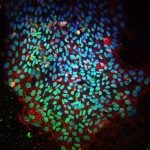Lien vers Pubmed [PMID] – 19948261
Bone 2010 May;46(5):1275-85
Mechanical forces are essential for normal adult bone function and repair, but the impact of prenatal muscle contractions on bone development remains to be explored in depth in mammalian model systems. In this study, we analyze skeletogenesis in two ‘muscleless’ mouse mutant models in which the formation of skeletal muscle development is disrupted; Myf5(nlacZ/nlacZ):MyoD(-/-) and Pax3(Sp/Sp) (Splotch). Ossification centers were found to be differentially affected in the muscleless limbs, with significant decreases in bone formation in the scapula, humerus, ulna and femur, but not in the tibia. In the scapula and humerus, the morphologies of ossification centers were abnormal in muscleless limbs. Histology of the humerus revealed a decreased extent of the hypertrophic zone in mutant limbs but no change in the shape of this region. The elbow joint was also found to be clearly affected with a dramatic reduction in the joint line, while no abnormalities were evident in the knee. The humeral deltoid tuberosity was significantly reduced in size in the Myf5(nlacZ/nlacZ):MyoD(-/-) mutants while a change in shape but not in size was found in the humeral tuberosities of the Pax3(Sp/Sp) mutants. We also examined skeletal development in a ‘reduced muscle’ model, the Myf5(nlacZ/+):MyoD(-/-) mutant, in which skeletal muscle forms but with reduced muscle mass. The reduced muscle phenotype appeared to have an intermediate effect on skeletal development, with reduced bone formation in the scapula and humerus compared to controls, but not in other rudiments. In summary, we have demonstrated that skeletal development is differentially affected by the lack of skeletal muscle, with certain rudiments and joints being more severely affected than others. These findings indicate that the response of skeletal progenitor cells to biophysical stimuli may depend upon their location in the embryonic limb, implying a complex interaction between mechanical forces and location-specific regulatory factors affecting bone and joint development.

